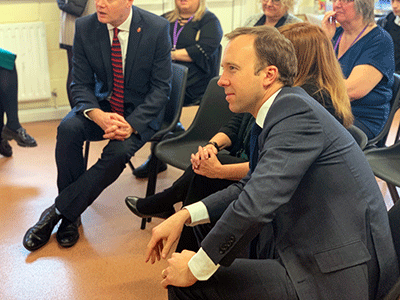Families are waiting to hear if health secretary Matt Hancock will keep to his pledge that every person segregated on mental health wards will have an independent review.
Hancock made the pledge after a critical report by watchdog the Care Quality Commission (CQC).

Health secretary Matt Hancock promised to fix the “broken” care system
The CQC’s report focused on the restraint and seclusion of people with mental health problems, learning disabilities or autism.
The CQC focused on 62 people who were in segregation, including 42 adults and 20 children and young people.
Some were as young as 11 years old. Sixteen people had been segregated for a year or more and one person had spent almost a decade secluded.
Most on mental health wards had autism
The CQC visited 39 people in segregation in mental health wards, most of whom had autism.
The most common reasons given for the segregation were staff and patient safety, and an inability to tolerate living alongside others.
Other reasons included delayed discharge from hospital due to a lack of suitable community care.
Hancock said that “a small proportion of some of the most vulnerable in society are being failed by a broken system that doesn’t work for them”.
Dr Paul Lelliott is the CQC’s deputy chief inspector of hospitals (mental health lead).
Urgent action needed
He said urgent action is “needed to strengthen the safeguards that protect the safety, welfare and human rights of people held in segregation”.
The report echoes two other investigations that also pointed up flaws in the care of people with autism and learning disabilities.
Anne Longfield is Children’s Commissioner for England. Her report found too many children spend months and years in institutions.
And Bristol University’s Learning Disabilities Mortality Review (LeDeR) found bias in care. It found 19 cases where medics had made “Do Not Attempt Cardiopulmonary Resuscitation” orders, with the reason given as “learning disabilities” or “Down’s syndrome”.
Related:
- Abuse ‘endemic across care system’
- Families fight detention ‘scandal’
- ‘Abject failure’ of hospital plan
- 100 restrained face-down in a month
- Ombudsman slams mental health care
- Four in five suffer poor mental health
- Still stuck in mental health hospitals
- Mental health problems go undiagnosed
- Scandal of child mental health spending















